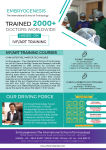
IVF NewsWebinar: INTUITIVE EMBRYOLOGY
International IVF Initiative 06 March 2021

Tuesday 9th March, 2021. 3PM EST / 8PM GMT /9PM CET Talks and discussions on daily laboratory management and thinking "outside the box". Moderators: Dr. Thomas (Rusty) Pool and Manar Hozyen with Dr. Julius Hreinsson Speakers: "Low, Low, Low! Tricky Sperm Counts and How to Prepare Them" "New Lab Equipment & New Results: What’s Important?" "How to Prevent Your Lab From Going Viral! Infectious Diseases & Handling Tips" "Biopsy Loading Made Easy" [ Full Article ] News: Basic Embryology Course
Seema Nair 04 March 2021
Webinar: RBMO LIVE
International IVF Initiative 01 March 2021

Tuesday 2nd March, 2021. 3PM EST / 8PM GMT /9PM CET Moderators: Professor Bart Fauser and Dr. Jacques Cohen “It is so, (if you think so)” Dr. Simone Palini Further thoughts from “Genomic DNA in Human Blastocoele Fluid” a former winner of the Robert G. Edwards Prize for the best paper published in RBMO Selected articles: “The Prevalence, Promotion, and Pricing of Three IVF Add-ons on Fertility Clinic Websites” "Preimplantation Genetic Testing for Aneuploidy in Severe Male Factor Infertility" [ Full Article ] News: Gene that guides egg points to cause of ectopic pregnancy
Beatrice Costa 01 March 2021
The risk of ectopic pregnancy may be influenced by regulation of a specific gene, according to new research. Ectopic pregnancies – where the fertilised egg implants and develops outside the uterus – are among the most common prenatal complications, yet the causes are poorly understood. A new study has identified a gene in mice, called Adgrd1, which is active in the fallopian tubes (also known as oviducts) and controls the transit of the eggs from the ovaries to the uterus. 'Though several risk factors of ectopic pregnancy are known, the precise genetic and molecular mechanisms behind the condition have remained unclear,' said senior author Dr Gavin Wright from the Wellcome Sanger Institute in Cambridge. 'The discovery of the function of Adrgd1 in oviductal fluid regulation, and the consequences of its absence, provides an important clue for researchers studying the causes of ectopic pregnancy in future.' In the study published in Nature Communications, the team used a large genetic database to show a clear link between Adgrd1 and infertility in mice. They examined ovulation and egg fertilisation and observed that, when Adgrd1 is suppressed, mice retain the embryos within the fallopian tubes and therefore become infertile. In humans, an egg is released from the ovaries and travels to the uterus via the fallopian tubes. Halfway there, the egg 'pauses' for several days at a specific location known as the 'ampullary-isthmic junction' where, if sperm is present, fertilisation can occur. The journey then continues and, only if fertilised, the egg will implant into the wall of the uterus. Several factors regulate the movement of the embryo to the uterus, among them are muscle contractions, cilia (tiny hairs) on the surface of the fallopian tubes which propel the egg towards the uterus, and the flow of the oviductal fluid. 'The flow of oviductal fluid in mammals is somewhat counterintuitive, in that it flows in the opposite direction to the egg's direction of travel,' said first author Dr Enrica Bianchi. 'What we've discovered in this study is that the strength of this flow is normally downregulated by the Adgrd1 gene. But when Adgrd1 is suppressed, the flow is not reduced and the egg cannot seem to move past the ampullary-isthmic junction.' The team hope to conduct further studies in humans, to explore the role of Adgrd1 and its potential correlation with the incidence of ectopic pregnancy. SOURCES & REFERENCES
[ Full Article ] News: ART & Embryology training program
Chennai Fertility Center and Research Institute 28 February 2021

November 2021 training batch schedule - 18th november 2021- 02 November training for clinicians in advanced reproductive technologies. Our skill and precision to all aspirants help them to know in-depth knowledge and experience. The members of our teaching faculty aim to bring doctors and embryologists to the highest level of knowledge about reproductive techniques and practical capability in the field. Our courses cover basics in andrology, embryology, ICSI and cryosciences (Hands-on). Limited Seats. For admission Contact 9003111598 February the month following January and preceding March More (Definitions, Synonyms, Translation) [ Full Article ] Webinar: PERSONAL GENETICS
International IVF Initiative 22 February 2021

Tuesday 23rd February, 2021. 3PM EST / 8PM GMT / 9PM CET Moderators: Dr. Helen O'Neill and Dr. Sissy Wamaitha [ Full Article ] News: Infertility risk linked to air pollution
Christina Burke 22 February 2021
High pollution levels can increase the risk of infertility by up to 20 percent, a study in China has found. The researchers wrote that their findings point to pollution as 'an unignorable risk factor for infertility'. It is believed to be the first study that examines the link between air pollution and infertility in the general population, rather than solely in fertility patients. 'Numerous studies have noted that air pollution is associated with lots of adverse pregnancy events,' lead author Dr Qin Li, from the Centre for Reproductive Medicine at Peking University Third Hospital in Beijing, China, told the Guardian. 'Our study samples were recruited from the general population, so our findings may be more generalisable,' he added. The study, published in the journal Environmental International, analysed 10,211 couples across eight Chinese provinces. The participants were recruited from the China Fertility Survey of Married Women, a national database of couples trying to conceive. The study focused on small, particulate air pollution, called PM2.5, most commonly produced by cars and industry. Infertility was defined as the failure to become pregnant after one year or more of attempting to conceive. The researchers estimated each participant's PM2.5 exposure over one, three, and five years. After accounting for factors such as age and lifestyle, they found that for every ten microgram increase in PM2.5 exposure, the risk of infertility rose by 20 percent. The average exposure level for each participant was 57 micrograms per metre cubed - much higher than the UK average, which varies between ten and 15 micrograms. Furthermore, when comparing the quarter of women exposed to the lowest amounts of pollution to the quarter exposed to the highest, infertility rates jumped from 15 to 26 percent. The researchers wrote that with further research, their findings 'might explain the increased infertility rates in polluted areas.' Currently, 30 percent of infertility remains unexplained following medical tests. This is not the first time low air quality has been associated with poor reproductive health. PM2.5 has been linked to circulatory and inflammatory health problems, as well as low quality sperm production. A recent study of 600 fertility patients in the US also showed increased pollution exposure was associated with a lower number of maturing eggs in patients' ovaries. Dr Tom Clemens, an expert in health and environment at the University of Edinburgh, remarked that the findings 'would be concerning if borne out in future studies as well, particularly in low pollution environments.' Commenting on how the risk of infertility from air pollution could be mitigated, Dr Clemens added: 'The emphasis should lie with policymakers, not with individuals.' SOURCES & REFERENCES
[ Full Article ] News: Enhance Your Vitrification Experience - Hurry! !! 2 Seats Remaining
Dr. Sarabpreet Singh 22 February 2021
News: Enhance Your Vitrification Experience - Extensive Hands on Training
Dr. Sarabpreet Singh 17 February 2021

Features Basics of Cryobiology Setting up of Cryobiology lab Details of vitrification protocols, media and devices Tips and tricks of vitrification [ Full Article ] News: Developing embryos reveal earliest immune response yet
Daniel Jacobson 15 February 2021
The earliest signs of an innate immune response have been identified in embryos, shedding light on why some fail to form properly during early development. As reported last week in Nature, early embryos, lacking specialised immune cells, are particularly prone to cellular defects which can lead to developmental failures. Researchers at the Centre for Genomic Regulation in Barcelona, Spain, found that cells in the embryo's epithelium, the first tissue to form during vertebrate development, are able to clear surrounding dead cells, thereby increasing chances of survival, in a process known as 'epithelial phagocytosis'. 'Long before the formation of the organs, one of the first tasks performed by a developing embryo is to create a protective tissue' said Dr Esteban Hoijman, lead author of the study. He added, 'like people distributing food around the dining table before tucking into their meal, we found that epithelial cells push defective cells towards other epithelial cells, speeding up the removal of dying cells.' The research was conducted using high-resolution time-lapse imaging technology to observe zebrafish and mouse embryos, two widely used model organisms for developmental research. This technique enabled the researchers to both see and quantify the process of defective cells being removed within the embryos. 'Here we propose a new evolutionarily conserved function for epithelia as efficient scavengers of dying cells in the earliest stages of vertebrate embryogenesis' said Dr Verena Ruprecht, who led the project. The findings of this research may have significant implications for treating infertility and early miscarriages. Dr Ruprecht added, 'Our work may have important clinical applications by one day leading to improved screening methods and embryo quality assessment standards used in fertility clinics.' The authors have suggested that future work will focus on applying these findings to treat infertility, as well as further study of how cells and tissues cooperate as part of other biological processes. SOURCES & REFERENCES
[ Full Article ] |